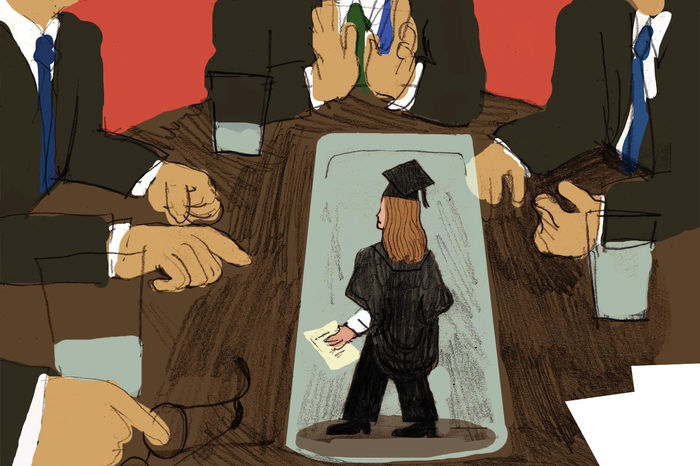Does studying STEM still guarantee success after graduation?
Beth Lee examines the cost of a career in the STEM industry, and whether these paths deliver on their promises

The scientist in the white coat, the maths whiz at the chalkboard, the doctor saving lives in the emergency room: these are the avatars of the industry and often our first point of contact with careers in STEM. The STEM push in schools sets up expectations of job security and the opportunity to contribute meaningfully to social progress. But have students been set up for disappointment?
STEM stands for Science, Technology, Engineering and Mathematics, and has received special attention in recent years with a spate of initiatives aimed at encouraging its study amongst those from underreperesented backgrounds. A recent systematic review of the literature on STEM career aspirations found that motivations for pursuing STEM included personal interest, the desire to help others, social influences, and “personal utility” factors like financial prospects and job security. STEM subjects are often presented in opposition to “softer” subjects like literature and languages, but evidence suggests that the difference is overstated.
Corey is a Maths graduate working in London, and spoke about the high levels of competition that graduates are facing. It took him eight months to land an internship at a cryptocurrency market maker, which led to his current role as a quantitative developer. He describes an oversaturated labour market with an increased emphasis on experience: “With a good STEM degree from a top uni, it’s almost harder in some ways because you don’t have any relevant experience for other jobs.”
“Better pay is not a STEM guarantee, especially for Cambridge graduates who typically earn at a higher percentile”
“To get a job, you have to have experience,” says Hannah, a recent Chemistry graduate from Homerton College and PhD-to-be at another top university. In her second year, she secured an internship at a research start-up through a government-funded scheme. After “cold emailing” another company the following year, she was offered an internship thanks to her experience with a specific technique at the start-up.
Hannah credits her PhD place to this industry experience: “Because I had those two internships, I was offered a PhD place […] before he had even looked at my application.”
By measure of graduate outcomes, the STEM advantage may be exaggerated. According to 2022/23 Higher Education Statistics Agency survey statistics, 60% of graduates from science subjects were in full-time employment 15 months after graduation, compared to 57% of non-science graduates. Subject-level statistics are the most surprising: a 2015 review by the National Centre for Universities and Business found that Computer Science students had the highest rate of unemployment among all disciplines six months after graduation. Ten years on, graduate outcomes for Computing graduates are still trailing behind other STEM subjects and most humanities, according to Government Longitudinal Educational Outcomes (LEO) data.
“Better pay is not a STEM guarantee, especially for Cambridge graduates who typically earn at a higher percentile”
The promise of better economic prospects also looks exaggerated at the higher end of earnings. Median salaries for STEM graduates do tend to outperform non-STEM subjects: LEO statistics show that median earnings five years after graduation were highest for Medicine and Dentistry graduates (£53,300). Vocational STEM subjects like Engineering (£41,600) and Veterinary Sciences (£40,200) performed better than Chemistry (£35,400), but just below Physics and Astronomy (£42,000) and on a par with Mathematical Sciences (£41,600). This compares well with subjects like English Studies (£28,000), and History and Archaeology (£31,000).
But a working paper by the Institute for Fiscal Studies using 2012/13 tax and student loan data shows that earnings at the higher percentile sometimes buck these trends. The 90th percentile of earnings for male Language and Literature graduates 13 years on from graduation was just under £80k, compared to just under £60k for Maths and Computer Sciences graduates. The 90th percentile for male History and Philosophy graduates was higher than Engineering, Maths and Computer Sciences, and higher still than Physical Sciences, whereas Physical Sciences and Engineering outperformed History and Philosophy at the median. This was mostly reflected in female earnings, but with smaller gaps. Better pay is not a STEM guarantee, especially for Cambridge graduates who typically earn at a higher percentile.
Careers in finance may pay well, but often at the cost of a work-life balance. Corey advises against going into investment banking or private equity, where “your hours will be pretty terrible”. His role as a quantitative developer offers a lighter workload, and his social life includes playing football in a work league, a weekly Bible study, company drinks at the office bar, and regularly meeting up with friends outside of work. His working hours are typically 9:30 am - 6 pm.
“There is a 56% wage premium for AI-skilled workers”
For Hannah, the work environment in a research start-up was a plus. She was apprehensive about joining a male-dominated company, but reflects that: “in the end they were just really nice guys.” Although it was “a bit bootstrappy,” sometimes with inadequate access to software, she found that flexible working hours and a welcoming environment made for a positive work culture.
Another concern with careers in STEM is high attrition. This becomes more significant as AI gains momentum: whatever our expectations, reality is changing faster than ever. According to PwC data, there is a 56% wage premium for AI-skilled workers, and job postings requiring AI skills in the UK grew at 3.5 times the rate of job growth generally from 2016-2024. Skilling up in AI looks to be well-advised for STEM job seekers; the difficulty is keeping pace with the rate of change. The skills needed in the most AI-exposed jobs are changing 66% faster than in the least-exposed jobs.
There is much discussion surrounding the problems the use of AI could bring for graduate job-hunters, but Corey says that students should: “use [it] to your advantage.” He thinks that research roles “where you’re the one asking the question” will not be replaced, and AI literacy is valuable. He continued: “If you understand what it is and what it can do […] then you understand what it can’t do and what the niches are that still need to be filled.”
He also suggests project work as a way for students to stand out from the pack: “A good side-project can be just as valuable as work experience if it’s more relevant.” Hannah recommends “cold emailing” companies with your CV to inquire about internship opportunities. Her experience is that: “most of them ignored me; some of them didn’t.”
The swing of the data is that STEM graduate outcomes are better, but not by much, and many STEM graduates are facing a stretched job market. There will likely be a growing mismatch of expectations and reality as AI changes the pace across industries; learning to leverage new technologies to their advantage will put STEM students in a stronger position. Nevertheless, there is still scope for a good work-life balance and a fulfilling career. For Corey, this means more than just the 9-5.
Names have been changed for privacy reasons
 News / Judge Business School advisor resigns over Epstein and Andrew links18 February 2026
News / Judge Business School advisor resigns over Epstein and Andrew links18 February 2026 News / Hundreds of Cambridge academics demand vote on fate of vet course20 February 2026
News / Hundreds of Cambridge academics demand vote on fate of vet course20 February 2026 News / Petition demands University reverse decision on vegan menu20 February 2026
News / Petition demands University reverse decision on vegan menu20 February 2026 News / CUCA members attend Reform rally in London20 February 2026
News / CUCA members attend Reform rally in London20 February 2026 News / Gov grants £36m to Cambridge supercomputer17 February 2026
News / Gov grants £36m to Cambridge supercomputer17 February 2026










